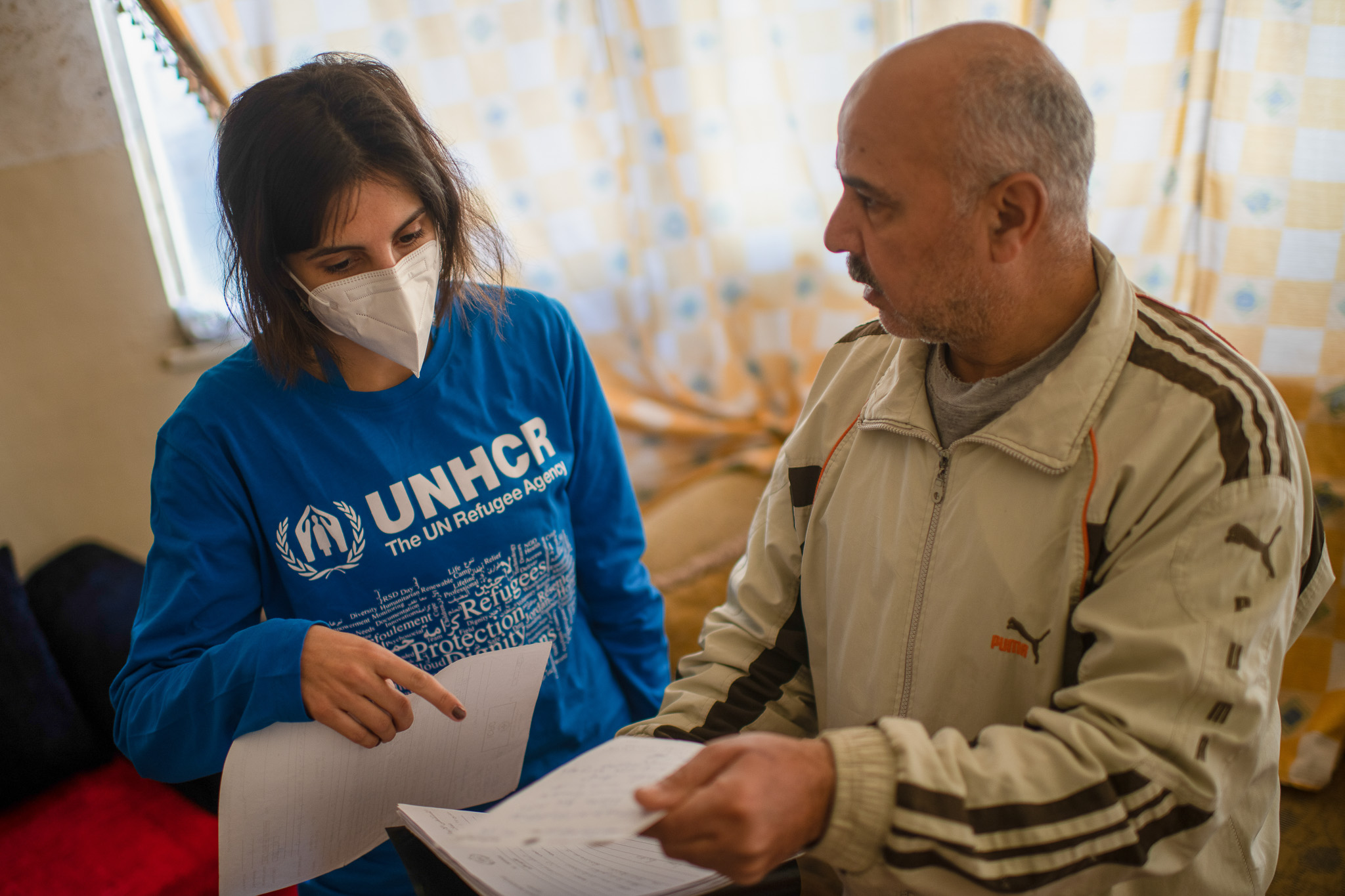Associate External Relations Officer

Khaled, from Syria, shows to Evie his wife’s medical file. Since arriving to Jordan they have had to do various medical procedures which UNHCR has supported. © UNHCR Mohammad Hawari
“Each one of us can foster solidarity towards refugees, by being kind, opening our hearts and welcoming them, listening to their stories, having a cup of coffee or tea with them, and thinking twice or three times before judging anyone”.
How would you describe your work?
In my day-to-day work, I engage with UNHCR’s governmental donors, mostly through building relationships with their embassies, conducting briefings, coordinating missions to the field and visits to projects run by UNHCR for refugees. I also prepare reports on the results of our programmes and work on communications, highlighting the impact of what UNHCR does, with the support of our donors, while showcasing stories of refugees who have found refuge in Jordan.
What made you decide to become a humanitarian worker?
Since my high-school years and throughout university, I’ve had a strong interest in human rights, especially for underserved populations, and would support charities as part of my extracurricular activities. I think it was a strong sense of commitment to serve those less fortunate than me. When the Syrian conflict and the refugee emergency reached Europe’s shores, particularly in 2015, this interest to serve those less fortunate matured into a motivation to help people who were forced to flee their homes. This was accompanied by a sense of urgency, given these events were unfolding in my home country. Thus, I decided I wanted to be part of this effort, much bigger than myself and my own country, and serve people in need of safety across the world.
Which is the greatest challenge you have faced working far from Greece?
The hardest part is being far from my family and my closest friends, especially when experiencing firsthand the emotional distress of the people we work with. My family and my friends are very important to me, they are my support circle, so being far away from them can put a strain on relationships and makes it more difficult to manage the more stressful moments of work and life. Nonetheless, I have been fortunate to build good relationships in every country I have lived in, which makes life away from home much easier.

Evie Prastakou (right) is discussing with Sabha, a refugee from Syria, her daughters and grandchildren at their home in Amman, Jordan. Sabha’s health had been deteriorating after she had a stroke, which affected her speech and she depended on her daughters for support. © UNHCR/ Mohammad Hawari
Please describe an experience you had working in the field, that you will never forget.
One of my earliest memories from the field dates back to 2016, when I was working with UNHCR in Greece. I was part of the emergency response team that was receiving refugees arriving on the shores of Lesvos. It was early morning, a small boat had just arrived, with more than 60 people, wet and exhausted from the difficult journey. Among them was an Iraqi man holding a young child. He approached me and asked me if they had reached Greece. When I said yes, he teared up and started praying, grateful for being safe. In that moment, I was deeply moved by his overwhelming sense of relief, his need to be safe, and his resilience.
What does solidarity mean to you and how could we foster it further?
At the most basic level, solidarity means standing next to your fellow human, supporting them in a difficult moment, offering a helping hand in a time of need. It means accepting them for who they are, independent of background, colour, nationality, ethnicity, religion. It also means sharing, uniting, being together. Each one of us can foster solidarity towards refugees, by being kind, opening our hearts and welcoming them, listening to their stories, having a cup of coffee or tea with them, and thinking twice or three times before judging anyone.

Evie (centre) and her UNHCR colleague Moh’d Taher are briefing the Ambassador of Ireland to Jordan, the Regional Humanitarian Advisor of the Irish Embassy, and the Director of the Humanitarian Unit in the Irish MFA, who visited Zaatari refugee camp in Nov 2022. © UNHCR/Shawkat Alharfoush
Share on Facebook Share on Twitter